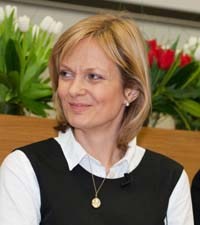
Linda Woodhead is Professor of Sociology of Religion in the Department of Politics, Philosophy and Religion at Lancaster University. She has published widely on the growth, decline and transformation of religions in modern times; in Christianity, in An Introduction to Christianity (CUP 2004) and A Very Short Introduction to Christianity (OUP 2004), and as co-editor of Religions in the Modern World (co-edited with Koko Kawanami and Chris Partridge). In The Spiritual Revolution (Blackwell 2005, with Paul Heelas) which grew out of the Kendal Project, she considered the significance of 'alternative' spirituality and reasons for its rapid growth since the 1980s. She is also particularly interested in issues of gender and has written several articles on the reasons for women's preponderance in spirituality, including a 'gendering' of the secularisation thesis.
Until 2013, Linda was Director of the £12m UK research programme, the AHRC/ESRC Religion and Society Programme. She is also the co-founder of the Westminster Faith Debates.
Visit our archives to explore the insider/outsider problem in the study of religion. We explore questions such as "What is an 'insider' or 'outsider'?" and "How do scholars of religion study and engage 'insiders'?" to begin unpacking what all is at stake in this process of group formation.
In this longer-than-usual episode, Chris and David provide an interlinking narrative between Grace Davie, Joe Webster, Carole Cusack, Jonathan Jong, Paul-Francois Tremlett, Linda Woodhead and Kim Knott, reflecting on current or future developments in the sociology of religion which challenge the ubiquity of the secularization thesis, ...
In what sense can a country be “Christian”? Today on the Religious Studies Project, we welcome back Professor Linda Woodhead to discuss and interrogate the question "Is Britain Still a Christian Country?", the topic of her recent Croall Lectures at the University of Edinburgh.
In this, the penultimate Editors' Pick, David tells us why he chose his interview with Linda Woodhead on the Secularisation thesis as his favourite. The secularisation thesis – the idea that traditional religions are in terminal decline in the industrialised world – was perhaps the central debate in the sociology of religion in the second half of the 20th century.
The inspiration for this episode came from one of Russell McCutcheon's works which we had encountered through the undergraduate Religious Studies programme at the University of Edinburgh, entitled 'Critics Not Caretakers: Redescribing the Public Study of Religion'. The result is this compilation of differing opinions and interpretations ...
What is the secularisation thesis? And how does it relate to the category of 'religion'? Join Linda Woodhead and David G. Robertson as they explore the development and ideas of the secularisation thesis.
This work is licensed under a Creative Commons Attribution- NonCommercial- NoDerivs 3.0 Unported License.
The views expressed in podcasts, features and responses are the views of the individual contributors, and do not necessarily reflect the views of The Religious Studies Project or our sponsors. The Religious Studies Project is produced by the Religious Studies Project Association (SCIO), a Scottish Charitable Incorporated Organisation (charity number SC047750).